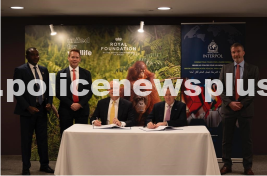INTERPOL, at the United for Wildlife Summit, has warned that environmental and wildlife crime has emerged as one of the world’s largest and most lucrative criminal enterprises, driving numerous species towards extinction. The illicit market for wildlife products, valued at up to USD 20 billion annually, has turned poaching and illegal wildlife trade into significant activities for organized crime, increasingly associated with armed violence, corruption, and other forms of criminality. This unlawful trade not only harms the environment and endangers endangered species, but also claims the lives of wildlife enforcement officers, with as many as 100 rangers being killed by poachers each year while safeguarding wildlife in their natural habitats.
This backdrop forms the basis for the agreement between The Royal Foundation and INTERPOL at the United for Wildlife Summit, outlining their collaborative efforts to combat illegal wildlife trafficking and protect endangered species. Lord Hague of Richmond, Co-Chair of United for Wildlife, emphasized the critical role of international law enforcement cooperation in thwarting the illegal wildlife trade, acknowledging INTERPOL’s longstanding partnership in this endeavor. Transnational criminal groups exploit wildlife globally, impacting vulnerable communities, posing risks to public health, and endangering the world’s natural resources. Stephen Kavanagh, INTERPOL’s Executive Director of Police Services, underscored the far-reaching influence of wildlife crime, which now ranks among the world’s largest criminal activities. He emphasized the connection between wildlife crime, armed violence, corruption, and financial offenses, ranging from money laundering to supporting other forms of transnational organized crime. Recognizing the scale and value of illegal wildlife trade on an international scale, Kavanagh highlighted the importance of financial and transport data in the fight against wildlife trafficking.
INTERPOL’s efforts, in collaboration with United for Wildlife taskforces, underscore the necessity of partnerships to create a safer environment for the world’s wildlife. INTERPOL aids its 195 member countries in raising awareness about violations of national and international regulations, bolstering their investigative and analytical capabilities, ultimately leading to decisive enforcement actions, such as the series of Operation Thunder initiatives. Since 2017, INTERPOL has coordinated Thunder actions, mobilizing law enforcement authorities from over 100 member countries, resulting in thousands of seizures and arrests worldwide in the battle against illegal wildlife trade.










